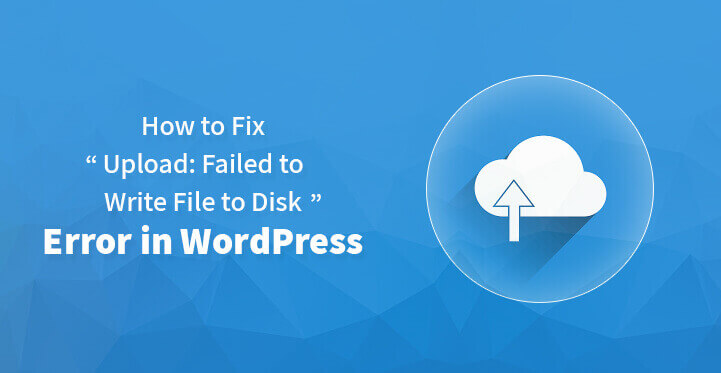5 quick fixes for 'Failed to write file to WordPress error disk'
You are trying to make an urgent update to your site, but it failed. Nothing can be more annoying for publishers than getting errors during site management.
Most websites are based on CMS software. WordPress is a CMS typically configured for sites. It also comes with its share of mistakes.
In our role as outsourcing technical support services for web hosts, WordPress errors are a commonly solved issue for customers reporting site problems.
- [message]
- Today we will see what causes the "WordPress Disk File Failure" failure on WordPress sites and how we fix it.
Causes for 'Failed to write file to disk WordPress error'
1. Folder or file permissions are incorrect
In order for any site to work well, the files and folders in it must have the proper ownership and permissions. Whenever the web server does not have enough permissions to write to the upload folder, it will give the error "Failed to write file to disk".
In some scenarios, certain backup and restore extensions, improper server transfers, WordPress update, or human error can also cause such authorization issues.
2. Temporary folder errors
WordPress runs on PHP. When uploading files, they are initially stored in a temporary folder before uploading them to the site folder.
The location of this temporary folder is set in PHP and related configuration files. This temporary folder can be filled up due to huge uploads or an upload process falling apart.
If this folder is full or has permission issues, the uploaded file cannot be saved and will throw errors. Incorrect path to the temporary folder in the configuration file can also lead to writing errors.
[post_ads_2]
3. Quota limit exceeded
Each user has a quota allocated to their account on the server. On shared hosting, users are charged based on their allocated storage.
Many publishers choose low-cost storage plans for their sites in order to save costs. But that storage can easily fill up, especially when there are huge subdomains and uploads.
When a user reaches their quota limit, they can no longer upload files to the account. That's when he sees an error "Failed to write a file to disk" on his WordPress site.
4. File system errors
Lack of disk space on the entire server can lead to site writing errors. We have seen cases where the folder/folder or / TMP on the server fills up for various reasons.
On some servers, we have also seen the hard disk go awry and read-only, which prevents write operations and causes errors in websites and services.
How to Fix 'Failed to Write WordPress Error File'
1. File permissions
The first thing we check is the folder and file permissions in the WordPress site installation. The 'wp-content' folder is the one containing the uploaded files.
For WordPress uploads to work properly, the folder and subfolders must have 755 permissions and files need 644. This can be configured via FTP, file manager, or command line via SSH.
To avoid authorization issues that arise during account transfers through servers, we follow an extensive checklist and do pre-transfer and post-transfer checks.
2. Temporary guide settings
If the folder permissions are fine, we take a look at the WordPress site logs and see what else is the problem. We review the settings and confirm that the temporary directory is set up fine.
It is verified that the permissions and ownership for this temporary folder are correct. If the temporary folder exceeds its size limit, we clear it and remove files that may exist due to incomplete uploads.
[post_ads]
3. Quota testing
We look at the user's disk quota and usage and confirm that they are within limits. In cases where the disk quota exceeds the limits, we can and find out what uses the space.
If unwanted files or trash consume the space, we clean and create space. Otherwise, we initiate a site plan upgrade and allocate more storage space to the account.
4. File system testing
Similarly, we look at disk space utilization in the file system and ensure that it is not missing. To rule out other errors on your hard disk, we validate the server logs in detail.
For servers we manage, we receive alerts whenever a disk problem occurs, and our 24/7 engineering team immediately resolves such issues to ensure that sites are not affected.
5. Extensions or hacks
In rare cases, some WordPress extensions or any malicious user hacking attempts may also affect the folder's permissions and cause typos. The incorrect format of the file name can also be a reason.
On the servers we manage, we periodically review and scan to prevent such hacking or malware attempts from affecting site functionality.


